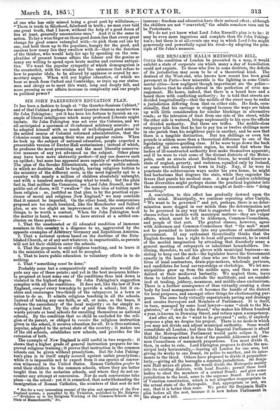SIR BENJAMIN HALL'S METROPOLIS BILL.
COULD the condition of London be presented in a map, it would exhibit a state of corporate sin which many a day of humiliation could not expiate. To those who live in some districts, the defects of its jurisdiction may seem to be of a theoretical kind. The denizen of the West-end, who knows how recent has been good pavement in Paris—how miserable is the lighting in some Conti- nental cities—how negligent though impertinent are the police— may believe that he stalks abroad in the perfection of civic ma- nagement. He hears, indeed, that there is a board here and a board there with conflicting authority; he is told that streets are divided longitudinally—that the middle of the street may be under a jurisdiction differing from that on either side. He finds, occa- sionally, that his carriage is stopped because the ways are taken up with little consideration for similar blockings in alternative roads ; or the intrusion of dust from one side of the street, while the other side is watered, brings unpleasantly to his eyes the effects of divided authority. But these are trifles. The middle-class ratepayer tells him that he has to pay ten or twelve shillings more in one parish than his neighbour pays in another, and he sees that there is a tangible distinction. But ten shillings or even ten pounds is seldom more than a theoretical difference to one of the legislating opinion-guiding class. If he were to go down the back alleys of his own aristocratic region, he would find where the ladies of ill-constructed authority first make themselves apparent; and if he were to visit some of the distant districts of the Metro- polis, such as streets about Bethnal Green, he would discover a state of neglect, poverty, and rudeness, equalled only by Ireland, or some wretched decayed town in Italy. Nay, if he were to penetrate the subterranean ways under his own house, he might find barbarisms that disgrace the state, while they engender the fevers that puzzle his medical man. A map of London exhibiting these diversities mightperhaps shame the practical legislator into the common resource of Englishmen caught at fault—into " doing something."
A conviction to this effect has gradually dawned upon the public mind. Municipally, we continue repeating after Carlyle, " We want to be governed !" and yet, perhaps, there is no deter- mination more dogged in our minds than the determination not to be governed in any way that is suggested to us. The genteel classes refuse to meddle with municipal matters—they are vulgar affairs, which must be left to Aldermen, Common-Councilmen, and people of that sort. The genteel classes, however, agree with Aldermen and Common-Councilmen that " the mob" must not be permitted to intrude into any questions of authoritative government. If any enthusiast theoretically thinks that the English freeman has a right to local self- government, he is cured of the morbid imagination by attending that disorderly scene a general meeting of ratepayers or inhabitant householders. De- clining, therefore, to soil his gloves with municipal business—as- sisting to keep out the mob—the legislator leaves the Government exactly in the hands of that class who are the friends and rela- tives of local contractors, drain-pipe-makers, wholesale paviours, and candidates for local surveyorships or clerkships. We let mu- nicipalities grow up from the middle ages, and then are scan- dalized at their mediceval barbarity. We neglect them, leave them to inferior bands, exclude the multitude, and are scandal- ized at trading, jobbery, meanness, and middle-class exclusivism. There is a further consequence of thus virtually creating a close body for local management—it becomes the handle of the district for local purposes, and amongst other things for electioneering pur- poses. The same body virtually superintends paving and drainage and creates Surveyors and Members of Parliament. It is itself, in turn, managed by some local lawyer—some " clerk to the Ma- gistrates," or "clerk to the Board," who makes his fifteen hundred a year, is known in Downing Street, and retires upon a competency. And after all, we do " want to be governed"; only, if anybody proposes a plan we despise his project. There is no mode in which you may not divide and adjust municipal authority. Some would consolidate all London ; but then the Imperial Parliament is afraid that the Metropolitan Parliament would quite eclipse it. The faithful Commons stand in fear of the possible Aldermen and Com- mon Councilmen of mammoth proportions. You must divide it,
then, in order to rule. Lord Ebrington proposes to divide the mu- nicipal body horizontally,—leaving all London for one area, but inter- ments its works to one Board, its police to another, and its nter- ments to the third. Others have proposed to divide it perpendion- larly,—giving all the boroughs a separate jurisdiction. Sir Benja- min Hall mixes all plans. He would divide the Metropolis mainly into its existing districts, with local Boards; permit these local bodies to elect the members of a central Board; and give some jurisdiction to the local, some to the supreme Board. It 18 a sort of Venetian constitution, which is not altogether inappropriate to the actual state of the Metropolis. But, appropriate or not, we say, that it is better than none. We prefer Sir Benjamin Hall a plan before all the rest, because it is now before Parliament in
the shape of a bill.


























 Previous page
Previous page